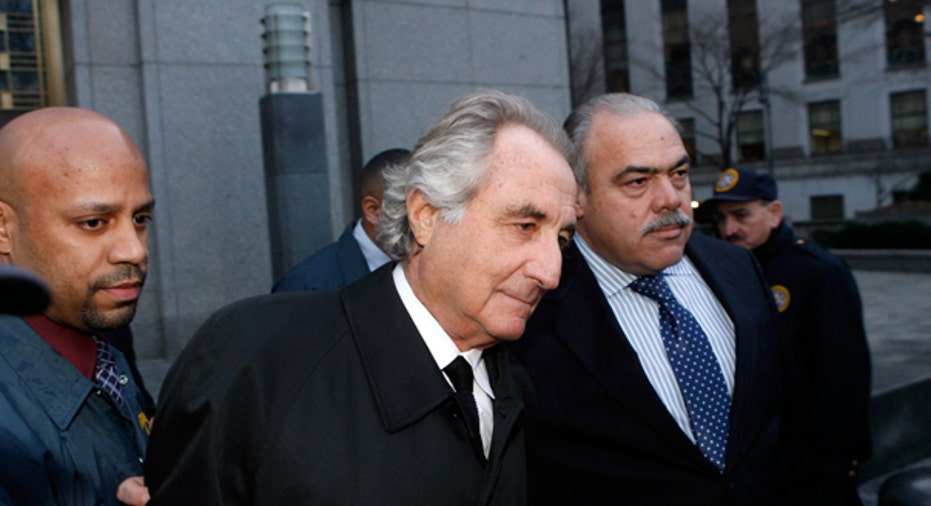JPMorgan's Madoff Deal Stands Out Among Bad Deals

The $2 billion deal JPMorgan Chase (NYSE:JPM) cut with the government to make its Bernie Madoff problem go away truly stands out among the blizzard of recent giant settlements between the largest U.S. banks and the regulators paid to keep an eye on them.
All of these deals have one thing in common: they allowed the banks to pay big fines in lieu of criminal prosecutions either of the bank itself or any individuals who might have been held culpable for alleged illegal activities. But remember this: while the fines look big in headlines they are usually spit in the ocean to the banks.
“Banks do not commit crimes; bankers do.”
Anyway, most of the high-profile settlements announced in recent months have been connected in one way or another to the run up to the financial crisis of 2008.
JPMorgan’s $13 billion deal for, among other misdeeds, selling investors doomed mortgage-backed securities falls into that category, as do recent settlements reached by Deutsche Bank (NYSE:DB) -- $1.93 billion -- and Wells Fargo (NYSE:WFC) -- $591 million -- for selling bad mortgage-backed loans to the U.S. ahead of the crisis.
There have been many others – Citigroup (NYSE:C), Bank of America (NYSE:BAC), Credit Suisse (NYSE:CS) have all benefited from these types of deals. And the list goes on, ad nauseam.
By comparison, those deals almost make sense when held up against JPMorgan’s payment for allegedly looking the other way for 20 years while Madoff ran the biggest financial fraud in history.
Differences Between Housing Scams and Madoff
In hindsight, the financial crisis was as much a cultural phenomenon as it was an economic condition.
The bottom line is that nearly everyone was making money off the U.S. housing boom early last decade so nearly everyone was eagerly participating in the scam. Practically everyone who owned a home, everyone on Wall Street and everyone involved in the home selling and mortgage lending sectors was involved and partially culpable. Holding one group – cynical Wall Street loan packagers, greedy mortgage lenders, naïve borrowers with bad credit – more accountable than another has proven elliptical at best.
Not so with JPMorgan’s involvement with Madoff. Only two entities benefited from that relationship: Madoff and JPMorgan.
Madoff benefited because banking with a prestigious firm like JPMorgan provided solid cover for his fraud, and JPMorgan benefited to the tune of hundreds of millions of dollars in fees generated by Madoff as he stole from Peter to pay Paul in an effort to keep his scam afloat.
For more than 20 years, virtually every dime Madoff collected from his clients/victims was deposited into accounts Madoff held at JPMorgan. And every dime withdrawn to maintain the ruse came out of those JPMorgan accounts.
A civil suit filed against JPMorgan by Irving Picard, the bankruptcy trustee appointed to recoup funds for Madoff’s victims, doesn’t hold back. The bank “was at the very center of that fraud and thoroughly complicit in it,” the suit states. As a sophisticated financial institution, JPMorgan was “uniquely situated to see the likely fraud.”
Red flags -- not least Madoff’s utter lack of transparency and the fact that his returns were consistently too good to be true -- were ignored “as the drive for fees and profits became a substitute for common sense, ethics and legal obligations.”
Picard suggests JPMorgan raked in “at least” $500 million in Madoff-related profits and should be held responsible for “at least” $5.4 billion in damages. (On Tuesday JPMorgan agreed to a $543 million settlement with Picard.)
“Bankers Commit Crimes”
Perhaps Dennis Kelleher, CEO of investor advocacy group Better Markets, put it best: “Banks do not commit crimes; bankers do,” he said.
Given the amounts of money that Madoff was churning through JPMorgan, it’s inconceivable that the bank didn’t have a point man – or a team of liaisons – responsible for monitoring Madoff’s accounts.
Of course they did. And these people were undoubtedly highly trained banking professionals well-schooled in the ‘dos’ and ‘don’ts’ of financial regulations. These are the people who had to know that Madoff’s entire operation was a fraud. Indeed, Madoff himself told my colleague Adam Shapiro, “There’s no question that JPMorgan is guilty. They would have to be idiots to not realize what was going on.”
JPMorgan issued a statement on Tuesday reasserting its position that none of its employees “knowingly” assisted Madoff.
Ron Stein, president the Network for Investor Action & Protection, an investor advocacy group formed in the wake of the Madoff scandal, speaks of a “moral responsibility” banking professionals should feel toward their clients.
Sadly, that moral responsibility still seems to be lacking, even after the Madoff debacle, Stein says. “I have yet to see the industry step up and be accountable to investors’ safety. Where are the industry leaders?” he asked.
Deals that allow a bank with $2.5 trillion in assets to pay $2 billion to sweep away its 20-year involvement with the single largest Ponzi scheme in history won’t help.



















